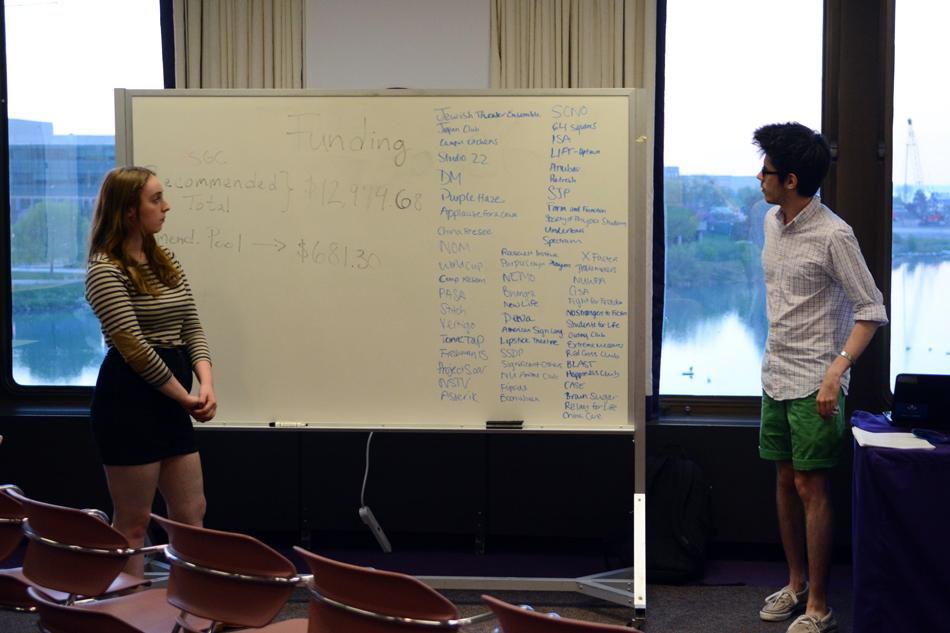ASG confirms B-status funding recommendations
Nathan Richards/Daily Senior Staffer
Petros Karahalios and Dana Leinbach listen as the Associated Student Government discusses B-status group funding at their weekly meeting Wednesday. This was the first time in at least four years there were no cuts or add requests from members of Senate or guests.
May 21, 2014
Associated Student Government confirmed on Wednesday B-status funding recommendations for Fall Quarter, with no cuts or add requests from members of Senate or guests for the first time in at least four years.
Senate allotted more than $12,000 to more than 50 groups during the meeting. Prior to the funding process, Alex Van Atta, vice president for student groups, described how it would work and emphasized the need for each group to be evaluated on their own basis.
“We are dealing with limited funds and we had 59 groups apply for funding so we couldn’t really fund everything that we wanted to,” the McCormick senior said. “We tried to only fund one event per group, their highest priority event that they could put on successfully in the fall and we tried to fund capital improvements with the limited funds that we had left.”
He said to effectively fund groups for their most important event, each group ranked their events in terms of priority.
“We really tried to make this an equitable process that hopefully will benefit all the groups,” he said.
ASG also discussed reforming the makeup of residential senators, in an effort to allot representation more accurately based on the number of students in different districts. This legislation proposes that instead of representing particular buildings, the new residential senators will represent a district to ensure there is more even representation across the board. It also addressed removing the distinction between residential college board senators and residential hall association senators.
The newly created districts make more numerical sense than before, in addition to being more geographically logical, said Weinberg junior Erik Zorn, executive vice president.
Chris Harlow, vice president for student life, added that the current makeup of RHA and RCB senators encourages the idea that a senator is responsible for an organization.
“We see this huge disproportion,” the SESP sophomore said. “Basically the current model does a couple of things. It reinforces that you as an RHA or RCB senator, it reinforces that you represent RHA or RCB when in fact, you don’t represent Elder, you represent the residents of 2400 Sheridan Rd., not the actual organization itself.”
Senate also confirmed Grant Nicholas as the new vice president of analytics. Rafael Henriquez, chief of staff, introduced Nicholas and emphasized the qualities he has that make him fit for the position. Nicholas outlined some of his goals for the upcoming year and talked about how he would carry out this position.
“He’s a really remarkable guy,” Henriquez said. “We chose him because he has clear expectations of what it should look like and what it should be doing and clearly values the relationship that this position is going to have with ASG.”
A piece of legislation proposing the creation of three working groups to analyze the use of CTECS was also discussed. The proposal outlined the focus of each individual group. The legislation also proposed a requirement for members of the groups to report back to Senate by December 2014 with their recommendations.
“We felt that it would be very important to create working groups to alleviate the problems that CTECs seem to cause which is like a large gap between how faculty perceive them and how students perceive them, both in their usage and in their effectiveness and students also found the problem of the accessibility of CTECS,” said Steven Bennett, an RCB senator.
Prior to the start of the official meeting, a focus group was held with the architects chosen to design the new student center in an effort to gauge student need and understand the facilities students would be interested in implementing in the new building.
Julie Payne-Kirchmeier, assistant vice president of student auxiliary services said the architects chosen provethey have the ability to innovate and create buildings aligned with their purposes.
A-status funding recommendations were also outlined and will be discussed further and approved at next week’s Senate meeting on May 28.
Email: [email protected]
Twitter: @beccasavransky


